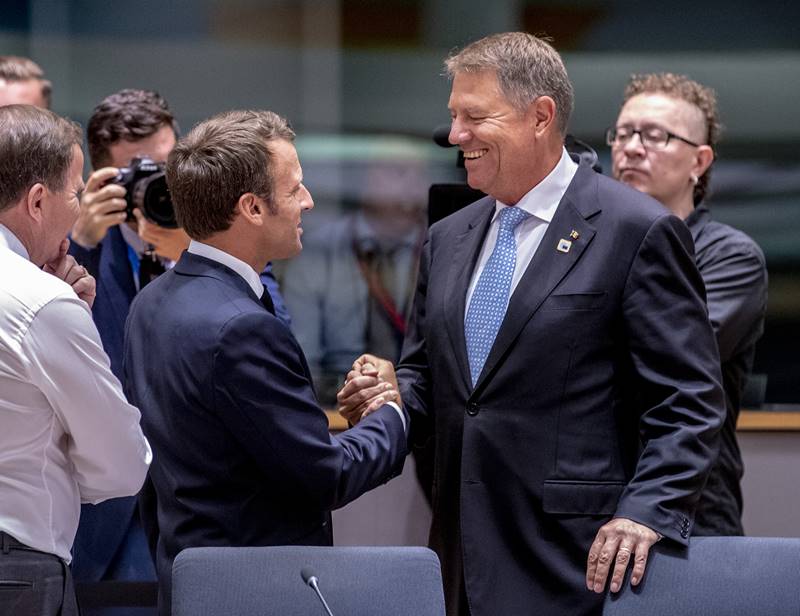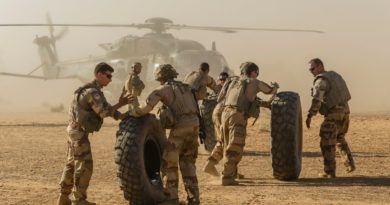The Lufy affair: intra-Libyan arms trafficking? a European problem?
(B2) At the European Union, we don't really want to comment on the "blunder" of Operation Sophia. The fact of having let a ship leave with weapons, without stopping them seems, indeed, difficult to explain.
Asked recently by a colleague, a senior European diplomat replied elliptically: "[The operation] Sophia has a warrant. We are working within this mandate [...] We have requested information from several vessels and this has resulted in two inspections ».
This deserves some explanation. And using my modest knowledge, I tried to do as educational as possible to enlighten our readers.
What is an inspection?
An "inspection" is not just a "friendly" visit. This is a real inspection (on the ground level, we could rather speak of a "search").
Concerning Operation Sophia, it operates within a specific framework: the arms embargo dictated by United Nations resolution 2292. It thus meets specific conditions, aimed at: 1° vessels “ to or from Libya » ; 2° when there are grounds “ reasonable to believe that such vessels carry weapons or related materiel » ; 3° this cargo being “ to or from Libya, directly or indirectly » ; 4nd " in violation of the arms embargo ».
How many inspections have been done?
Two inspections were actually carried out (official figure). One of them, on the Luffy (or al Luffy) did not result in any press releases or seizures. (NB: According to information from B2, the ship which was going from Misrata to Benghazi, was simply sent back to its starting point: Misrata). No public explanation was given either on the existence of weapons or on the nature of the weapons or on the reason for the release, even if this information leaked in the press (Read: The Libyan government circumvents the arms embargo. With Sophia's consent?).
The second inspection, a few days later, on the El Mukthar, gave rise to seizure and disclosure. Hard to do otherwise. Meanwhile, a (small) explanation of engraving had taken place, in a discreet meeting of the COPS (read: Weapons aboard a Libyan ship. A first entry for Sophia (V2)).
Have other "discoveries" been made without inspection?
This subject is verytouching" (to speak Franglais). And none of our usual interlocutors is really talkative on the subject, most roll their eyes or change the conversation. But it seems that other discoveries of weapons have taken place, since February, on "Libyan" ships without giving rise to either prosecution or formal inspection. This can only raise questions and a certain impatience from several countries (in particular France and the United Kingdom) to see the embargo on the weapons bypassed.
If we find weapons on a ship, is it still against the embargo?
Some weapons may not be in violation of the arms embargo. These were weapons clearly intended for the self-defense of a ship (pistol, even Kalashnikov...). But, in this case, it must be clearly justified. And the number should not be extraordinary. Could machine guns or rocket launchers fall into this category? We can doubt it. But it's a matter of interpretation...
Do the Europeans have a general power to inspect or visit all ships and seize all weapons?
No. Some ships enjoy sovereign immunity under international law as provided for in United Nations Resolution 2292 (§7) prohibiting "searches" on certain vessels: warships, state-owned or state-chartered ships. This rule presupposes recognizing the right to acquire arms for elements of the Libyan Government of National Unity and ships bearing a "letter of patent". Above all, this assumes that the vessels concerned can obtain an official document, stamped, attesting to this exercise. This also assumes that this document emanates from the government and not just from one of the government entities (without approval from the others, a more than difficult question in Libya). This may suppose, finally, that this list is communicated beforehand to the authorities in charge of monitoring the embargo (therefore to the European operation or to the UN secretariat), to avoid any misunderstanding. Again, it's a matter of interpretation.
What happens when there is immunity?
A visit or inspection cannot take place on board. The ship enjoys diplomatic privilege. Any "discovery" then becomes (normally) null and void.
Is there room for interpretation of opportunity?
This is the whole question that seems to be asked in this case. On the one hand, there seems to have been weapons on ships, "on the fringes" of the arms embargo, whose evidence of belonging to the Libyan authorities was not obvious. On the other hand, immunity does not appear to be really solid in legal terms. Rather, it has a "political" nature. Thus the take can be considered "too weak" to be significant or to play a fundamental role in the civil war in Libya. It could, on the other hand, complicate already complex relations with the Libyan government of national unity.
Clearly, if this government affirms to the European authorities that this ship does indeed belong to the Libyan authorities, and that it therefore benefits from immunity, the question arises for the military authority to play the rigor and seize the weapons or to play a more political game by "closing our eyes" in exchange for more determined action on certain points (coastguard training, etc.). We are here in a matter of opportunity. " There are differences of opinion on this point between the Member States analyzes a connoisseur of these military issues.
Who decides what happens next?
Under no circumstances are the sailors carrying out the inspection or reconnaissance (French, Germans, Lithuanians) the ones who can take the decision themselves to allow a ship to pass or to stop it. Any search and discovery of weapons are immediately reported to FHQ, the force headquarters, an Italian ship (the ITS Garibaldi until the beginning of April, the LPD San Giusto then. Read Italian relay at the head of the EUNAVFOR Med maritime force). The information goes back very quickly to the OHQ in Rome, placed under the authority of Rear Admiral Credendino who commands the operation. Moreover, the search is sometimes filmed to avoid any misunderstanding.
Can the operation commander make a decision alone?
The operation commander has a certain margin of appreciation determined both by his mandate – the decision of the Council – but also by the operation plan and the rules of engagement. Beyond these rules of engagement (where he has a certain autonomy), he must refer to his political and military authorities. On the one hand, the High Representative of the EU, Federica Mogherini (with the EU military committee and the political and security committee), on the other, her national hierarchical authority (the head of the national navy, and the Italian Defense Minister). The problem for the military is to have a political opinion as quickly as possible. What to do in the middle of the night when an incident occurs? Is it possible to get a quick answer... assuming there is one?
NB: In all cases, the operation commander must forward an incident report to his hierarchical authorities who are thus kept informed (of the nature of the incident and of the measures taken). And a report must be drawn up and sent to the Security Council of the United Nations.
Are these isolated cases or a well-organized network?
Do these men or this network have a link with the Libyan Coast Guard? According to our information, at least one sailor from the Lufy was on board another ship that was boarded. This presupposes at least the existence of an organization. And the relations between these ships and the Libyan authorities in Tripoli suggest that these ships which transport weapons do so with the consent, even the order, of certain members of the Government of National Unity (probably not of all). .
Is an explanation necessary, public?
Yes. In any case, the facts are sufficiently serious, and the information precise, for all the light to be shed on this affair. The European Union, which intends to see its defense policy considered fundamental, and to defend its values, must explain itself clearly. And all the facts must be established precisely. Either there were no weapons, and it must be said clearly. Based on the information obtained by B2 as the Spiegel, this seems to be very difficult to defend. Either these weapons had some justification. We cannot take refuge, in matters of violation (or not) of an arms embargo, behind a rule of secrecy. It's a matter of credibility...
(Nicolas Gros-Verheyde)
(1) This immunity concerns “ warships and naval auxiliaries [and] other vessels owned or operated by a State and used exclusively, on government non-commercial service » and their cargo if it is « used exclusively for non-commercial public service purposes ».

